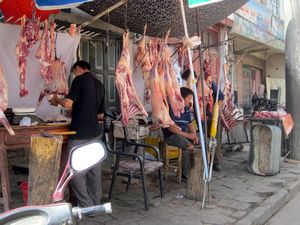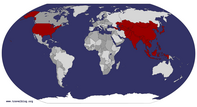Advertisement
Published: September 25th 2010

 MEAT
MEAT
In the old town.We got to Kashgar at around midnight, ate some la mian (had tomato sauce and tasted a lot like spaghetti! yum!!!) and chuanr (kebabs) on the street, and attempted to find a hotel. Except all the hotels we found where either really expensive, all booked, or didn't take foreigners. There's some rule that foreigners can't stay in less than three star hotels. We had some exchanges that went like this:
Us: "Hello"
Them: "Hello"
Us: "Do you have rooms available tonight?"
Them: "Yes we do."
Us: "How much for two people?"
Them: "blahblahblah"
Us: "That sounds good"
Them: *awkward smile*
Us: "So we'd like to get a room."
Them: "Oh..... I'm sorry.... 不好意思 (kind of like I am embarrassed to say that..) you can't stay here."
Us: "Why? You said there were rooms available."
Them: *more awkward smiling* "Yes but you don't have..."
Us: "Oh foreigners can't stay here?"
Them: *mad awkward smiling* "ummm.." *nod*
Anyway we learned to straight-up ask them if they took foreigners before discussing other details. We also found some other foreigners on their way to their hostel. One guy had an awesome French accent - he jokingly introduced his friend, "he is a con-veekt!"
But yet again there was no room at the inn. At 1 or 2 am we finally found Seman Hotel (色懑宾馆)which was cheap, plus it had an awesome name to mispronounce, a working shared bathroom and internet.
The next morning we set off to explore the old town. The old town had lots of traditional Uyghur mud brick houses that people still live in. Despite being rather central, the old town was not bulldozed and modernized. Around the places where people live were lots of shops selling all kinds of things, including animal carcasses and dental work. The dental industry seemed to be very big in Xinjiang. There were lots of advertisement signs in all these cities, and we indeed saw some grandmothers with sick grills. We spent some time just strolling about the alleyways, enjoying the sunny day and the golden-brown color of the walls. Inside the walls were nice outdoor courtyards. Sometimes we caught a glimpse of them through a piece of fabric hanging over the doorway. There was government propaganda (in both Chinese and Uyghur) spray painted on the walls. There were also signs on the doorways that said "文明家庭" (stable family" and “平安家庭” (peaceful family).

 Traditional Architecture
Traditional Architecture
With a party banner over it...After our wandering, we hit some sites. First we went to the Apakh Hoja Mazar (their transliteration), or the Fragrant Concubine Tomb. The Fragrant Concubine, a Uyghur woman recognized for her distinctive smell, was emperor Qianlong's favorite concubine. Qianlong lived longer (70+ years) than many other emperors, plus I guess he was a very productive guy, because like half of the tourist attractions I go to mention him! I'm always like "damnnn Qianlong... here too?" Outside, Kayleigh and I made friends with the cutest camel!! We saw that her (assuming, due to her pink bow) water-storing humps were empty and floppy, so we tried pouring our bottled water into our hands and getting her to drink it. When we did that, she kind of put our whole hand into her mouth. She was always swinging her head around and looking at us. The tomb itself was a grand site, covered in tiles of splendid blue, green and deep orange. I really liked the architectural style because it was like nothing I had seen in real life before. Around the tomb was an expansive cemetery with long rows of graves stretching far into the distance. There was also a mosque
at the site. We left, walked through a neighboring village a bit and caught a cab to the Yusup Has Tomb.
Yusup Has was a great Uyghur poet and intellectual. This tomb was also fantastic. It was covered in tiles with brilliant blue patterns. The building was similar in style to the other tomb. The weather was amazing and it was great to just stroll about. We were nearly the only tourists there. From the tomb site, we could see middle school kids doing military training.
Next, we wanted to buy a ticket for the next day's trip to Karakul lake, so we decided to take a cab to the bus station. There are two bus stations in Kashgar, so our cab driver asked us where we wanted to take the bus to. We replied that we wanted to take the bus to Karakul lake. Most of the cab drivers in Kashgar were Uyghur and whether they spoke some decent Chinese was sort of hit-or-miss... so it didn't help that during this particular exchange, we were having a tough time communicating. Anyway, the guy was like (in Chinese with a very thick accent and not using any tones)
"ohh Karakul lake! I will take you now, 200 kuai." We responded, "No! We want to take the public bus!" He kept saying "we will go now, 200 kuai" We told him that we wanted to get out of the cab. He finally said he would take us to the bus station for something like 20 kuai. Lots of cab drivers in Kashgar either had broken meters or didn't use them, so we had to haggle about our taxis too. We knew that Kashgar was not that big and it couldn't have been more than a 10 kuai cab ride. So we told him that 20 kuai was unreasonable and we would only pay 10 kuai. He told us "不行” ("not okay") and when we protested he said "你们不行" ("you are not okay"). He dropped us off in an abandoned parking lot on the edge of town and claimed we were there! We only handed him a 10 and walked away before he could have a problem with it.
This abandoned parking lot was clearly not a bus station though!! When we got off the cab, we were greeted by a swarm of men with cars, offering expensive rides

 Me and a Kid
Me and a Kid
In an alleyway.to Karukul Lake, Tashkurgan, Tian Shan, etc. But we wanted nice, official, printed bus tickets that would guarantee us spots on the next day's bus. We asked a nice guy in the parking lot (who was not selling anything) how to buy tickets for the bus to the lake. He said there wasn't a way to buy tickets ahead of time and it would leave from there tomorrow at 10 am. However, on the internet, I had read of people taking a bus to the lake from a public bus station. So, we caught another cab to the bus station and this time we just said "international bus station" and not our destination.
At the bus station, "Karakul Lake" and the price was written on the wall of destinations! "没有/meiyou" literally means "don't have/haven't." In practice, I find that it is used whenever someone doesn't want to help you, and it is never followed by any kind of explanation. (I definitely encountered this when I went to the national entry-exit building in Beijing to ask some questions about visa extension! I never found anything out and at that point was still unsure if I would have to leave the
country in September.) Here was our conversation, translated from Chinese.
Us: "When is the earliest bus to Karakul Lake tomorrow?"
Ticket lady: "Meiyou."
Us: "What day is the next bus to Karakul Lake?"
Ticket lady: "Meiyou."
Us: "Can you take a bus to Karakul Lake from this station?"
Ticket lady, getting annoyed: "Meiyou."
Us: "Is there a different bus station with busses that go to Karakul Lake?"
Ticket lady: "Meiyou."
Us: "So it's written on the wall here that there are busses that go to Karakul Lake, right?"
Ticket lady: "Yes."
Us: "But there are never any busses that go to Karakul Lake from here?"
Ticket lady: "Yes."
Us: "So what changed? How can we get to Karakul Lake now?"
(Ticket lady is pissed by now and waves us out of the line.)
After we got out of line, we asked a Chinese-looking customer for advice. He went on a big rant about how he was in the same situation... his destination was listed, but they had also "meiyou"ed him! We decided to just head for the abandoned parking lot the next morning and at worst, haggle with someone about a ride. After all those troubles, we returned
to Seman Hotel and sat down for big bottles of Wusu beer in the cafe.
The beer made us much happier, and we set off for dinner at nearby Pakistan Cafe. (Kashgar is only hundreds of kilometers from India, Pakistan, Kazakhstan, Kyrzikstan, Afghanistan...) On our way over, we walked by a group of soldiers with big guns and riot shields patrolling the streets. They happened to be walking in the same direction as us, so we were worried we would make them suspicious, especially because we kept looking at them and taking pictures! But it was too strange to not document. The area they were patrolling was peaceful and everyone was simply going about their day, so the soldiers looked so out of place. It was still Ramadan, so we wandered around for a bit waiting for the sun to set before eating. The food was similar to Indian food - chickpea slop, spinach slop, bread, and tasty cool yoghurty sauce.... delicious. It was a cozy place where lots of Pakistanis (living in Kashgar or just visiting) seemed to like to hang out. They were all super friendly and their English was fantastic, so we enjoyed chatting. A good
end to our day in Kashgar!
Advertisement
Tot: 0.191s; Tpl: 0.012s; cc: 8; qc: 49; dbt: 0.0522s; 1; m:domysql w:travelblog (10.17.0.13); sld: 4;
; mem: 1.2mb


















